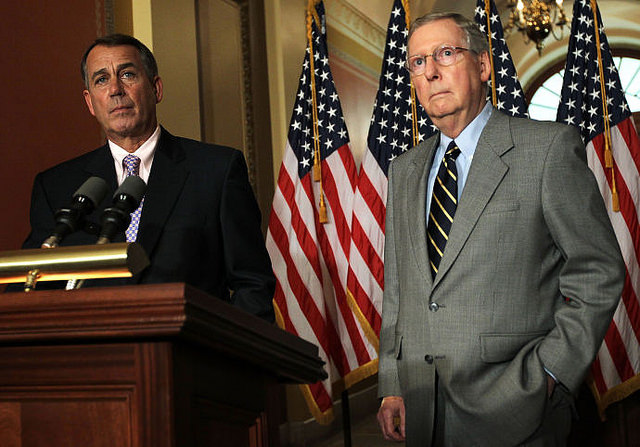 Tick-tock. The ball drops on the fiscal New Year Wednesday night. Absent a deal on how to fund government starting October 1st, workers will stay home, national parks will be closed, and agencies won’t be able to perform their jobs.
Tick-tock. The ball drops on the fiscal New Year Wednesday night. Absent a deal on how to fund government starting October 1st, workers will stay home, national parks will be closed, and agencies won’t be able to perform their jobs.
That everything would come down to the last minute was entirely predictable back in July, or even earlier. The House gave up after passing only six of the dozen required spending bills (every one of them facing a veto threat). The Senate never got started – not a single spending bill was even debated on the Senate floor, much less adopted. There were disagreements about whether and how much to bust the spending caps established by the Budget Control Act of 2011 (BCA). Once the dissension regarding efforts to defund Planned Parenthood are thrown in, you have an appropriations conundrum of Gordian knot proportions.
Senate Majority Leader McConnell is taking a swing at that knot. He and Appropriations Committee Chair Thad Cochran (R-MS) drafted legislation to extend government funding until December 11 that also included a provision to defund Planned Parenthood – the bill failed under a veto threat so they quickly turned around with legislation that removed the provision. To skip a few parliamentary hurdles (votes) they amended a revenue-related bill that the House had already adopted. That had the added bonus of allowing a six month extension of Federal Aviation Administration (the authorization that includes airport ticket taxes and funding also expires Sep. 30) be added since it was tax related. It still would require a couple procedural votes in the Senate to get through. With time running short, that was at least a vote too many, so Leader McConnell grabbed another bill that had been passed back and forth by the House and Senate and used that as the vehicle. That sets up a cloture vote on Monday to end debate and could lead to a vote on final passage on Wednesday.
It’s still not clear what the House will do, and Speaker Boehner’s pending resignation just clouds the waters further although some have indicated that it makes a shutdown less likely in the short term.
The machinations are enough to make your head hurt. Further, the new legislative vehicle is not a revenue bill so the FAA extension had to be jettisoned, adding another item on the Congressional to-do list before next week. And it’s still not clear that a shutdown will be avoided or that all of the issues will be resolved to enact full year funding bills in December.
The main issue to be resolved is the level of spending. That may seem a bit obvious considering the twelve spending bills establish how much will be spent by government each year, but in reality the aforementioned BCA already established the level of spending for fiscal year 2016. It’s just that the President and most of Congress don’t like those levels and want to spend more. To be clear, both defense and non-defense discretionary spending see a slight rise in FY16 over the FY15 levels. But for lawmakers it isn’t enough.
Problem is, they can’t just ignore the BCA because any spending over the caps gets chopped back down to size through across-the-board sequestration cuts. So, as was done in 2013, policymakers are going to have to come up with some sort of compromise that provides offsets for any spending increases they desire and amend the BCA. Or not. But whatever they are going to do, the time to figure it out is now, not some last minute deal cobbled together in the early days of December.










